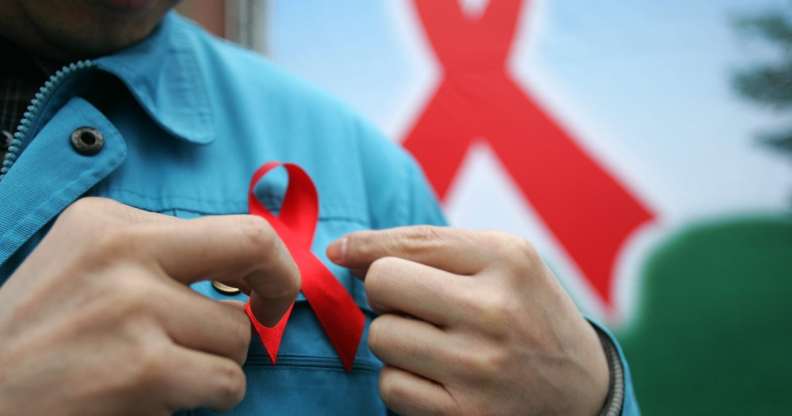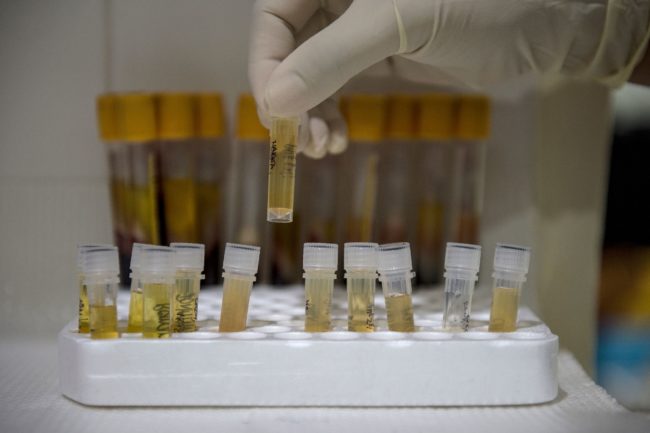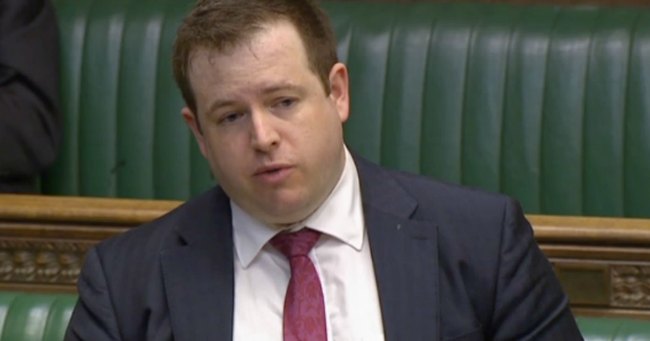Criminalisation of homosexuality is setting back the global fight against HIV/AIDS

A worker wears a red ribbon for World AIDS Day (China Photos/Getty)
Anti-gay stigma in middle income countries is harming the global fight against HIV/AIDS, a report has warned today.
The report, launched today by a cross-party group of UK parliamentarians on HIV and AIDS, warns that marginalised groups “risk falling behind in the HIV response” because of stigma.
The No One Left Behind report highlights gaps in provisions for marginalised groups in middle income countries, as international donors are refocussing funding in poorer regions.

An HIV test (Creative Commons)
It warns: “The aid landscape is changing with 70% of people living with HIV expected to live in middle income countries by 2020. As globally, donors are pulling out of middle income countries, the HIV epidemic is becoming more concentrated in those countries.”
The transition to to domestic funding in such countries risks leaving key groups behind – in part because of the stigma attached to homosexuality.
It warns: “In many middle-income countries, key populations are criminalised by the national government.
“The legal threat and atmosphere of fear and intimidation created by criminalisation laws alongside wider stigma, discrimination and violence experienced by key populations act as a barrier to accessing HIV prevention and treatment services.
“Criminalisation laws which affect homosexuality, sex workers, drug users and the transgender community, significantly reduce the likelihood of national government taking over services for key populations.”
The report calls on the Department for International Development and the Global Fund to Fight AIDS, Tuberculosis and Malaria to “work together to ensure there are no gaps in HIV service provision for marginalised populations when they withdraw from middle income countries and to provide additional funding when it is needed.”

HIV testing (NOEL CELIS/AFP/Getty Images)
It urges the stakeholders to “commit to developing long term sustainable transition plans that take into account the complexity faced by marginalised populations and women and girls accessing HIV treatment, and to ensure all actors are included in the transition process from the start.”
It adds: “DFID should work with the FCO to ensure there is an understanding of the detrimental effects of punitive legislation on public health outcomes and work with country partners to challenge these laws where they still exist.”
Chair of the APPG on HIV and AIDS Stephen Doughty MP said: “It would be a tragedy if we fall back in progress on tackling HIV/AIDS because we have ignored the needs of some of those most affected by HIV – marginalised groups living in middle income countries.

Labour MP Stephen Doughty
“Many governments throughout eastern Europe and central Asia are either unable or unwilling to fund these groups because of institutionalised stigma and anti-equality laws. The same phenomenon could face many African countries also graduating from low income status.
“As a major donor in the global HIV response, the UK needs to lead the way in championing the rights of these groups to access HIV treatment, otherwise we risk the HIV epidemic going backwards.
“We should not see this as a zero sum game where donors are faced with a stark choice of targeting funds at women and girls in low income countries where they are disproportionately affected versus marginalised groups in middle income countries where there is also a major problem with HIV.
“This is a false choice as neglecting either group will lead to devastating consequences for the HIV response. Donors need to wake up to this fact and prioritise both of these key groups in need of targeted interventions.
“Funding marginalised groups is politically unpopular in many countries where for example drug users, sex work or homosexuality are criminalised.
“The current trend is to withdraw HIV funding in middle income countries because these governments should technically have the financial ability to provide HIV services for their own populations. Unfortunately this is most often not the case, particularly for marginalised groups who are being neglected by international donors and their own governments.”
“With 70% of people living with HIV expected to be in middle income countries by 2020 this is a major concern. If we are serious about ending the HIV epidemic we need to ensure these groups are not left behind.”

